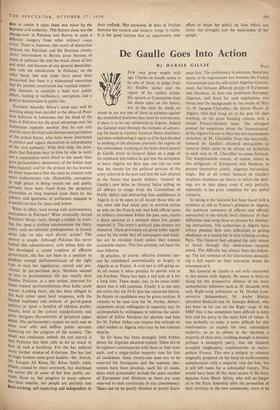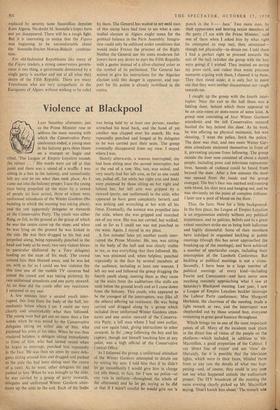De Gaulle Goes Into Action
By DARSIE GILLIE FEW men grow supple with age. Charles de Gaulle seems to be one of them, to judge from his flexible tactics and the vigour of his sudden action. His speech at Constantine kept the doors open on the future, but at .the time he made no threat to use any one of them to advance against the established positions that must be overthrown, if there is to be any settlement in Algeria. Indeed the General went through the motions of advanc- ing his hand to transfer General Salan elsewhere and then withdrawing it again as if he had decided to prolong to the elections precisely the regime of the referendum. Looking at the letter that General de Gaulle wrote to General Salan on a page of his notebook just before he got into the aeroplane to leave Algeria ten days ago, one can see now that the thanks for the political services of the army referred to the past and that the task allotted to the future was purely military. General de Gaulle's new letter, to General Salan calling on all officers to resign from the Committees of Public Safety and instructing that candidature in Algeria is to be open to all except those who on the rebel side had taken part in terrorist action or who on the French, side had held official posts or military command Within the past year, marks a sharp advance at a moment when few people expected it. The army's political pipe-dreams are shattered. These provisions are given fuller signifi- cance by the order that all newspapers and week- lies are to circulate freely unless they contain actionable matter. This has certainly not been the case hitherto.
In practice, of course, effective freedom can- not be established automatically as largely in Algeria as in France. A civil war is still going on. At all events it takes practice to permit and to use freedom. There has been a sad lack of it for a long time. There needs, too, to be some confi- dence that it will continue. Finally it is not only the army, but the FLN that has restricted liberty. Its threats to candidates may be given realities. It remains to be seen how far M. Ferhat Abbas's statements about willingness to negotiate may be accompanied by willingness to tolerate the candi- dature of fellow Moslems for election and how far M. Ferhat Abbas can impose this attitude on rebel leaders in Algeria who may be less tolerant than he.
So far there has been strangely little written about the Algerian electoral system. There are to be eighteen constituencies with three or four seats each, and a single-ballot majority vote for lists of candidates. Since twenty-one seats are to be reserved for Europeans and the separate elec- torates have been absolute, each list of candi- dates must presumably include the same number of Europeans and Moslems as there are seats reserved to each community in any constituency. There can be no purely Moslem or purely Euro- Paris pean lists. The preliminary to elections, therefore, seems to be negotiations not between the French Government and the self-styled Algerian Govern- ment, but between different groups of Europeans and Moslems. At least one prominent European Algerian, well fitted for such negotiation, was thrust into the background by the events of May 13, M. Jacques Chevallier, the liberal Mayor of Algiers, who had hung on to his post till then working on his great housing scheme with a mixed Franco-Moslem team. The strongest ground for scepticism about the 'fraternisation' of the Algiers Forum in May was the simultaneous exclusion of M. Chevallier from his mayoralty. General de Gaulle's electoral instructions to General Salan seem to be almost an invitation to such men as M. Chevallier to come forward. The Integrationists cannot, of course, object to this obligation of Europeans and Moslems to present themselves jointly. Algerian nationalists might. But at all events General de Gaulle's emphatic insistence on liberty in which the deal- ings are to take place, even if only partially realisable, is the prior condition for any useful initiative.
In taking it the General has been faced with a problem as old as France's presence in Algeria, the stubborn resistance of officers and officials entrenched in the strictly local character of their difficulties and using these as excuses for disobey- ing instructions. The authorities in Algiers have always pleaded their own difficulties in getting obedience as a reason for in turn refusing to obey Paris. The General had adopted the only means to break through this obstruction—surprise attack. The difficulty has always been the follow- up. The last sentence of his instructions demand- ing a full report on their execution shows his awareness of it.
But General de Gaulle is not only concerned in this matter with Algeria. He seems to have•no liking for the prospective alliance of his more authoritarian followers such as M. Soustelle with such Right-wing politicians as M. Duchet (con- servative Independent), M. Andre Morice (dissident Radical) and M. Georges Bidault, who has been so far out on the Right verge of the M RP that it has sometimes been difficult to keep him and his party in the same field of vision. It was probably to make it more difficult for this combination to exploit his own referendum majority, so as to obtain at the elections a majority of their own, crushing enough to become perhaps a monopoly party, that the General accepted single-party constituencies in metro- politan France. This was a setback to schemes originally prepared on the basis of multi-member constituencies with a majority vote for lists, but it still left room for a substantial victory. This would have been all the more secure if the forty deputies from Black Africa, who will no longer sit in the Paris Assembly after the promotion of their territory in the new community, were to be replaced by seventy tame Soustellian deputies from Algeria. No doubt M. Soustelle's hopes have not yet disappeared. There will be a tough fight. But it is interesting to notice that the Figaro was beginning to be uncomfortable about the Soustelle-Duchet-Morice-Bidault combina- tion.
For old-fashioned Republicans like many of the Figaro readers, a strong conservative govern- ment is one thing, a government dominated by a single party is another and not at all what they desire of the Fifth Republic. There are many Frenchmen who are very sympathetic to the Europeans of Algiers without wishing to be ruled by them. The General has waited to act until men of this stamp have had time to see what a con- trolled election at Algiers might mean for the political balance in the Paris Assembly. Integra- tion could only be enforced under conditions that would make France the prisoner of the Right. Neither the General nor his more moderate fol- lowers have any desire to start the Fifth Republic with a gaoler instead of a silver-chained usher as the symbol of its parliament. The General has waited to give his instructions for the Algerian election until this danger is, apparent, and sup- port for his action is already mobilised in the centre.



































 Previous page
Previous page